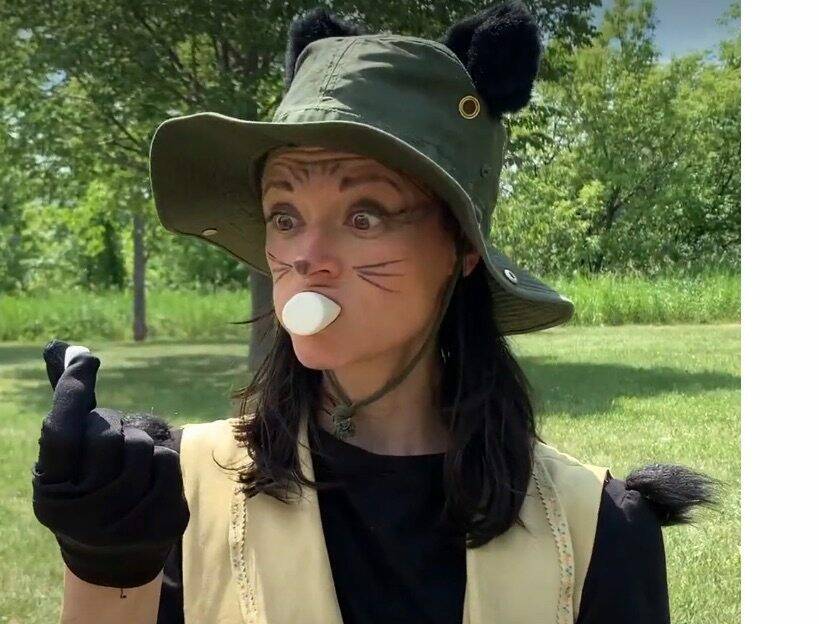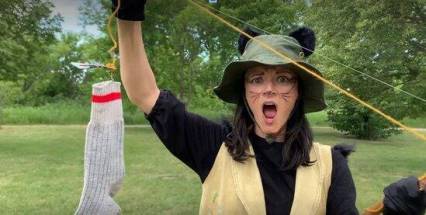Endangered language gets playful revitalization Kids fringe show performed entirely in southern Michif
Read this article for free:
or
Already have an account? Log in here »
To continue reading, please subscribe:
Monthly Digital Subscription
$19 $0 for the first 4 weeks*
- Enjoy unlimited reading on winnipegfreepress.com
- Read the E-Edition, our digital replica newspaper
- Access News Break, our award-winning app
- Play interactive puzzles
*No charge for 4 weeks then billed as $19 every four weeks (new subscribers and qualified returning subscribers only). Cancel anytime.
Read unlimited articles for free today:
or
Already have an account? Log in here »
Hey there, time traveller!
This article was published 20/07/2022 (843 days ago), so information in it may no longer be current.
In Michif, minoosh means “kitty,” “la tacheer” is the word for teapot and “poonam” translates into English as “makes a fire.”
These are among the Michif words audience members can hear and learn during Minoosh Doo-Kapeeshiw, a Métis-themed show aimed at kids that runs until Saturday at the Winnipeg Fringe Theatre Festival.
Theatre preview
Minoosh Doo-Kapeeshiw
Echo Theatre
• Winnipeg Fringe Theatre Festival
• MTYP Mainstage (Kids Venue)
• Remaining shows: Friday, 12:45 p.m., Saturday, 12:30 p.m.
Charlene Van Buekenhout, a longtime fringe performer and producer, as well as programming and artistic director with the Dalnavert Museum, spent some of her spare time during the pandemic pause learning southern Michif, a dialect of the language spoken in southwestern Manitoba.
Van Buekenhout, whose mother’s family has Métis heritage, took classes in southern Michif at the University of Manitoba and online courses through Where Are Your Keys, which aims to revitalize endangered languages.
Michif and its dialects are derived from Cree, Ojibwe and French, and emerged in the 1700s in Canada, along with the beginnings of Métis culture, when French- or English-speaking fur traders married Indigenous people.
”I took French immersion, so a lot of the French-sounding words I could pick up, so that part was easy, but I had no Cree, so that part was more difficult,” Van Buekenhout says. “I just wanted to learn a language that might be close to what my ancestors spoke.”

She says the language’s structure isn’t complicated; unlike English or French, for instance, southern Michif uses only the third person and verb endings remain the same.
The best way to lock in newly learned linguistic skills is to speak, read and write in the new tongue, so Van Buekenhout merged her love of theatre with her new southern Michif skills into Minoosh Doo-Kapeeshiw, and her company, Echo Theatre, teamed up with the Louis Riel Institute to produce the show at the fringe’s Kids Venue, the Manitoba Theatre for Young People’s mainstage.
The 30-minute show is an expanded version of a short video that was part of Winnipeg fringe’s virtual festival in 2021.
Van Buekenhout plays Minoosh, an adventurous young feline, and uses physical comedy and mime to tell a story of the kitty going camping — doo-kapeeshiw means “to go camping” in southern Michif — and finds new friends. She acts out the words that are spoken in the Métis language by a narrator.
She got the idea of incorporating southern Michif with theatre when taking classes from Heather Souter, a Michif instructor at the U of M’s native studies department.
Five-star fringe

Posted:
The Winnipeg Fringe Theatre Festival has returned after a two-year absence and Winnipeg Free Press reviewers have been there to share their insights on the festival’s 113 shows. All those reviews are now available on the Free Press website, but as the festival enters its final weekend here are 10 reviews that earned five-star accolades from the Free Press fringe team.
“What I found works for me (is) when Heather would tell stories and use context and gesture to teach. She didn’t want to do a lot of translating, so she did a lot of showing us what she meant using her face and gestures,” Van Buekenhout says.
“This was very theatrical… I’m used to gesture, context and repetition and using my body to learn things.”
Minoosh doesn’t speak during the play but when she holds up everyday objects during her journey, the narrator announces what they are in Michif.
“There is no English in the show; it’s all narrated in Michif,” Van Buekenhout says. “That was my big plan, that I would teach everybody Michif. I’m not sure if that’s happening because you have to see it more times.
“I’m probably the one learning the most because I get to hear it over and over again.”
alan.small@winnipegfreepress.com
Twitter: @AlanDSmall

Alan Small
Reporter
Alan Small has been a journalist at the Free Press for more than 22 years in a variety of roles, the latest being a reporter in the Arts and Life section.
Our newsroom depends on a growing audience of readers to power our journalism. If you are not a paid reader, please consider becoming a subscriber.
Our newsroom depends on its audience of readers to power our journalism. Thank you for your support.












